- Home
- Stacey Kade
For This Life Only Page 5
For This Life Only Read online
Page 5
“I don’t know. Maybe. It depends,” I hedged. I couldn’t take his reaction to the truth.
The shock on Zach’s face told me he’d never considered the possibility. Obviously Coach hadn’t made the announcement to the whole team yet.
“It’s okay,” I said again, feeling like that was all I could say these days. But it was always a lie.
Zach blinked at me, stunned into silence.
“Um, hi,” a new voice said, startling all of us.
The girl in the debate team sweatshirt had left her friends to hover near me, her hands tucked up inside her sleeves.
“I wanted to say, I’m so sorry about Eli.” Her voice cracked, and fresh tears rolled down her cheeks. “He was on the debate team with me, with us.” She gestured to her group of friends, who were now watching with damp-eyed gazes. “He was, like, really, really good.”
Zach and Audrey exchanged uncomfortable looks.
It took a second for my drilled-in manners to kick in. “Thanks,” I said, forcing a smile that felt more like baring my teeth.
“And he was so nice,” she continued, choking on a sob. “When we went to Springfield last year for tournament, I forgot to bring extra money for food. And I couldn’t tell Mrs. Springer because she would have flipped out. But Eli . . .” She paused, her lower lip trembling. “He bought me cheeseburgers. Like every day for three days. He knew they were my favorite somehow.” She laughed through her tears. Then her face crumpled, and she was crying for real.
Oh, no.
I looked helplessly to Audrey and Zach for an assist, but they were both studying the ground like it held the answers to the next SAT prep test.
“Yeah,” I said finally. “Eli was like that.” And he was, always paying attention to everybody else around him, collecting details, trying to make people happy. Perfectly perfect, leaving me to be perfectly inadequate, which had been fine when he was here. But now what?
Not knowing what else to say, I reached out and patted the debate team girl’s shoulder. It seemed like an Eli thing to do.
But my action only seemed to encourage her grief. She crashed into me, throwing her arms around me like I was the only piece of solid land for miles.
Anyone who’d stopped staring previously had now rejoined the fun, as I tried to keep my balance.
“I keep telling myself that it’s okay, that he’s, like, in a better place, right?” She looked up at me, desperation and misery written across her face. She wanted me to reassure her, to help her, even though I had no idea who she was.
It clicked then with a jolt that I felt through my whole body: I was her Eli stand-in. As difficult as it was for my family, Leah, and probably others to look at me and see Eli, this girl was the opposite. She was looking for me to be him, to say what he would have said.
“Right. Yes.” The words tasted like lies, but I forced them out anyway. What was I supposed to do instead? Shove her off me and tell her I had no idea? That I got Eli killed and the darkness I’d experienced might mean there was no “better place”?
She nodded, and I could feel her trembling recede slightly.
The bell rang then, way too late to save me, and she released me, backing away with an embarrassed smile. “Thank you,” she said with a deep breath and a few remaining sniffles.
“Sure.” The tension in my jaw and neck tightened until it seemed like something in there might snap.
“You okay, man?” Zach asked uncertainly.
No. “Yeah. Let’s get out of here,” I said, limping toward the doors.
• • •
The morning went downhill from there. In the back of my mind, I must have thought that the worst was over, but nope.
By the time I got to fourth hour, Pussy PE, my face hurt from maintaining a semblance of a polite smile, and my skin felt thin from too many people touching me, whether it was a reassuring thump on the back or more full-on, sneak-attack hugs that were an attempt to console or meant to be a sign of mutual grief. And the longer I was here, the more comfortable people seemed to be with approaching me.
I couldn’t deal. My pain meds were wearing off, and the nurse’s office seemed like an impossibly long hobble away from this end of the building.
Pussy PE was held in one of the smaller chemistry labs not in use this hour. I paused at the doorway to look for a place to sit and to catch my breath. Hauling myself up and down the hallways with the cast, as light as it was, was work. Even with physical therapy twice a week, I wasn’t prepared.
Most of the seats were already filled. I recognized a few faces, mostly from the mocking they took when they showed up on the first day of gym with their schedule change to be initialed by Coach or Mrs. Lloyd.
A girl in a wheelchair with a cannula running from her nose sat next to a chick in a back brace. Then there was a dude who appeared to have something wrong with his hands; they were too thin and curved in oddly toward his chest. Another kid had no fewer than three asthma inhalers laid out precisely on the table in front of him, like surgical instruments.
It was a room full of broken and damaged people. The dent-and-scratch section of the school, like the aisle of the appliance store where my parents used to get all of our refrigerators, washers, and dryers before they had the money to buy better.
And I was now one of them.
With a barely repressed sigh, I limped into the room.
Everyone stared, but by this point, I was too tired to care. The only empty seat was next to Chad Hardwick—a tall, superskinny guy rumored to have hemophilia—in the third row on the left side.
As I approached, a girl in the second row glanced up at me, shoving her dark and crazy curly hair out of her face. Then she froze, her mouth open.
Surprised recognition pinged through me. Thera Catoulus.
Of course she’d be in here. Last year, she’d claimed that Doug and Aaron had cornered her in the gym on their way from the lifting room. The principal probably didn’t want to give her an opportunity to make more accusations of harassment. Putting her in Pussy PE would keep her under closer supervision and out of the way.
Thera’s face, already so white that her eyebrows were like dark slashes, paled further, and her throat worked in a hard swallow as she stared at me. She half rose from her seat and then stopped, confusion and a horrible flash of hope crossing her face.
Oh, shit. She thought I was Eli.
Eli had always collected people; I’d just never realized how many until today. I’d never realized Thera was among them, either. My dad would have been pissed if he knew.
As kids, that had been one of the earliest warnings Eli and I had been given at the church: stay away from across the street. My parents hadn’t even called it Psychic Mary’s, probably for fear that we’d be more interested. Her services were, according to my dad, “not something you want to mess with,” and then there was what it would’ve looked like if we were caught over there. Even in the yard.
I waited with dread for the burst of tears when Thera realized who I was. Or rather, who I wasn’t. It had been happening off and on all day.
But instead, the moment it clicked, Thera recoiled, jerking back as if she’d smelled something bad, her lip curling in disgust as she dropped into her seat.
Whatever. I kept moving toward the third row. I needed to sit down before I fell down.
“Hey, man,” I said to Chad. “This seat taken?”
He shook his head, but scooted over to the far edge of the table, as if I might shove him there anyway.
I dropped into the plastic chair, shrugged my backpack off to the floor, where it landed with a resounding thud, and stretched my leg out in front of me, swallowing a groan of relief.
Ahead of me, Thera had frozen in a rigid posture, her shoulders squared as though I might chuck a book or a throwing star or something at her from behind.
“Greetings, children,” Mr. Sloane said with a wave of his coffee mug, his MacBook tucked under his arm. He was the drama teacher and had been suppos
edly working on a screenplay on the side for, like, the last ten years.
He nodded at me, an acknowledgment of my addition to the class, and then moved a red-and-blue molecular model of something out of the way and set down his laptop. Within seconds, he was engrossed in whatever was on his screen.
• • •
The hour passed slowly, each minute ticking loudly on the ancient analog clock that hung crookedly on the opposite wall.
It was so quiet I could hear the asthmatic kid breathing, and so hot I could feel sweat trickling down my spine. I didn’t belong here.
After a while, the words on the page in front of me—The Great Gatsby for English—began to blur together. With only a few minutes left in the period—how was I going to get through this every day?—I gave up and leaned back in my chair to massage the overworked muscles in my right leg. My gaze landed on Thera. She was practically invisible behind her long hair, her head down as she scrawled in her notebook.
When the bell rang, she jolted at the sound and stood quickly to stuff her notebook and books into a ragged canvas bag covered with a weird mix of patches, including some I recognized from a brief stint in the Boy Scouts.
She was tall, probably only a few inches shorter than me. I’d never been close enough to her before to notice. Her clompy black combat boots and tight dark jeans, almost as black as her hoodie and her hair, made her look even taller. The jeans also drew attention to a rather spectacular ass, which I felt vaguely guilty for noticing.
When she slammed the last book in place, a pen fell out and skittered across the floor.
I spoke up without thinking. “Hey, you lost your—”
She spun around, and to my shock, her dark eyes were filled with tears. Then she leaned toward me until mere inches separated us. I could see one tiny freckle, like a spot of ink, under her right eye.
“It should have been you,” she said, each word a cold, hard bullet, enunciated carefully so I wouldn’t miss it. “Eli was worth ten of you.”
Her words stole my breath. It was something I’d been thinking, something I knew other people thought. No one else had had the balls to say it.
But it was the raw grief in her eyes, as deep, horrible, and personal as anything I’d seen from Leah yesterday, that really shook me. I’d been watching people cry over Eli all day. Eli as a concept. Eli as the nice guy in class. Eli as someone they knew who was now dead.
But this was different. Who was this girl to Eli? Or maybe, who had Eli been to her?
She straightened up abruptly and turned away, moving toward the door with purpose.
“Hey, wait,” I called after her.
But she ignored me.
By the time I levered myself to my feet and limped to the door, she was halfway down the hall, threading her way through the mob. As I watched, she gathered her hair and tucked it into the neck of her shirt with a practiced motion. Then she tugged her hood up and over her head and vanished into the crowd, like a magic trick.
CHAPTER SEVEN
* * *
THE ONLY GOOD THINGS about physical therapy were that it was exhausting and it hurt. Getting through the reps and exercises took everything I had, to the point where I couldn’t focus on anything but getting through it.
And then afterward, I was normally too tired to think about anything except the pain and trembling sense of overwork in my arm and leg.
But not today, unfortunately.
My brain kept cycling back to Thera Catoulus. What she’d said. How she’d stormed off.
Her reaction didn’t seem like everyone else’s. That wasn’t just grief today. That was anger and frustration and loss, and you didn’t feel that for someone who, I don’t know, loaned you a quarter for the vending machine, did you?
Not unless you were seriously unstable, which, okay, maybe she was, given her history.
But she didn’t seem unstable. She seemed pissed. A sentiment I completely understood. Which, to me, meant she’d known Eli in a way that would have generated those emotions.
That last night, before we crashed, I’d asked Eli if he was cheating on Leah. He’d been acting so weird. But I’d been joking. Mostly.
Now I wasn’t so sure. If he was messing around with Psychic Mary’s daughter, that would explain the weird. In more ways than one.
A familiar pang of guilt shot through me. By all logic and justice, he should have been the one to survive. He was the good one. He was the one wearing his seat belt. He was the one who should be here, not the one who was gone.
“Everything all right?” my mom asked, startling me. We were almost home. “Was therapy okay?”
“It was fine.” I’d said the same thing about school, when she’d asked.
She sighed, but said nothing more.
Frustration bloomed white-hot. I couldn’t give her the detailed reassurances she wanted. I didn’t have them to give, not without asking questions about faith, God, and fate that she wouldn’t want to hear.
I slunk lower in my seat and kept my head down in an attempt to prevent further inquiries.
The umbrella—pink-and-white-striped—stuffed in the organizational bin between our seats brought back the memory of that bright blue umbrella sailing past my face during the accident.
That night, Eli had been asking questions about doing the right thing. And no matter what he’d said then, I was beginning to think now he hadn’t been talking in the theoretical.
“Mom, was everything okay with Eli before . . . before?” I asked. “Do you know if something was bothering him?”
She tensed, glancing over her shoulder to the rear seat, where Sarah was strapped in. When I looked back, Sarah was watching both of us from her booster seat.
“No,” Mom said quickly. “Everything was fine.” Her tone indicated that this should be the end of the conversation.
I wasn’t sure if she was afraid I was trying to question things that were a certainty to her, or if she knew something and didn’t want to discuss it.
“But I think maybe he—” I began.
“Jace,” my mom said in warning. “Not now.”
“Right,” I said, swallowing my frustration.
As we rounded the corner onto our street, my mom slowed, frowning.
I followed her gaze. A vaguely familiar SUV, a black BMW, was parked in our driveway.
“Who is that?” I asked. Drop-bys were a big no-no at our house. It was a rule—or it used to be, at least—that all visits had to be cleared ahead of time. The illusion of perfection had to be maintained. No dirty dishes on the counter or piles of laundry spilling out into the hall. Nothing that could be reported back to the congregation or whispered about.
Before she could answer, the front doors of the SUV popped open. On the driver’s side, Mr. Hauer, Riverwoods’ council president, climbed out. On the other, his daughter and Eli’s girlfriend, Leah.
Her long blondish-brown hair swung in a ruthlessly straight line at her shoulders. She was wearing her St. Luke’s uniform; the white blouse was slightly rumpled after a long day of classes, but her tie—in the same blue-and-black plaid as her skirt—was perfectly knotted and in place at her throat. She looked washed out, a faded version of herself.
Leah and her dad moved to the back of their SUV to wait for us.
“Can we pretend we don’t see them?” I asked my mom. Maybe it made me a coward, but I couldn’t do this right now. I couldn’t see the pain on her face again.
“Hush,” my mom said, but not with any harshness.
My mom pulled in the driveway and parked next to them, summoning a bright smile. “Rick, how wonderful to see you!” she called out as she pushed open her door.
I took an extra second to steel myself and then followed her example.
“Mr. Hauer,” I said when I reached them, offering my right hand to the closest thing my dad had to an earthly boss, all too aware of my sweaty clothes and likely stench.
He shook my hand without hesitation, squeezing hard in that man-test kind
of way. “Jacob, glad to see you up and about,” he said too heartily, as if yesterday had never happened.
Leah said nothing, staring somewhere over my right shoulder, like she couldn’t look directly at me.
We stood there for a long awkward beat until my mom intervened.
“Would you like to come in?” she asked. “Let me just get Sarah.” She moved past me, squeezing between our vehicle and theirs to pull the sliding side door open.
Before the accident, Sarah would have gotten herself unbuckled and wrestled the minivan door open on her own, or would have at least been loudly protesting about being forgotten.
This version of Sarah was waiting meekly in her seat.
“We don’t want to interrupt your afternoon,” Mr. Hauer said as my mom lifted Sarah out and then took her hand. “I’m sure you folks are busy.”
Why did everything he said sound so patronizingly jovial and fake? Had it always and I just never noticed?
“Leah wanted a chance to speak with Jacob.”
“Of course. Let’s go inside.” My mom led everyone up the front stairs and through the door, which we never used ourselves, and then turned to me. “Jacob, why don’t you and Leah talk in the living room?”
She gestured to the room across from us, as if neither Leah nor I knew where it was located. As if I wanted to have this conversation, whatever it turned out to be, with Leah in any location.
Then my mom turned her attention to Mr. Hauer. “Rick, I have some of that coffee you like. Sumatra, right?”
He nodded. “Yes, that’s it.” He sounded delighted and surprised. But my mom was good with people.
“Come on back to the kitchen,” she said, waving him forward. “Let me get Sarah settled with a snack, and then you can tell me more about the expansion plans. Micah said the council was meeting with the architect again.”
With a warning look at me that I couldn’t interpret, my mom led Mr. Hauer down the hall, leaving Leah and me alone.

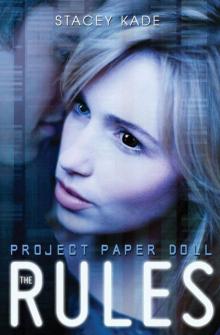 The Rules
The Rules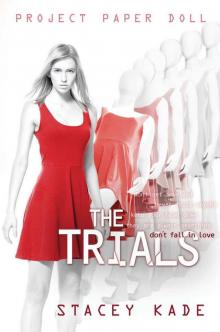 The Trials
The Trials For This Life Only
For This Life Only The Ghost and the Goth
The Ghost and the Goth Finding Felicity
Finding Felicity The Hunt
The Hunt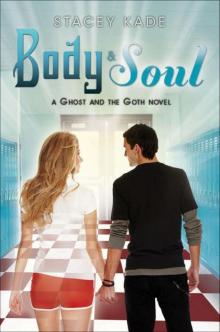 Body & Soul
Body & Soul Starlight Nights
Starlight Nights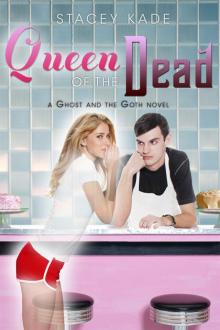 Queen of the Dead tgatg-2
Queen of the Dead tgatg-2 The Ghost and the Goth tgatg-1
The Ghost and the Goth tgatg-1 738 Days: A Novel
738 Days: A Novel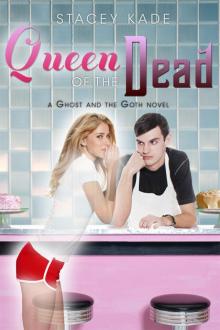 The Ghost and the Goth 2 - Queen of the Dead
The Ghost and the Goth 2 - Queen of the Dead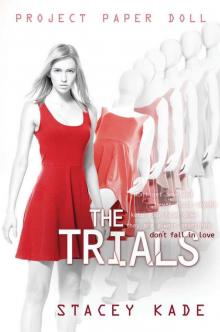 Project Paper Doll: The Trials
Project Paper Doll: The Trials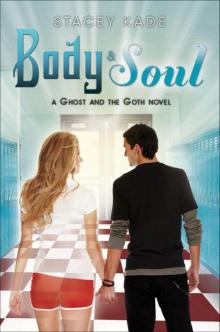 Body & Soul (Ghost and the Goth Novels)
Body & Soul (Ghost and the Goth Novels)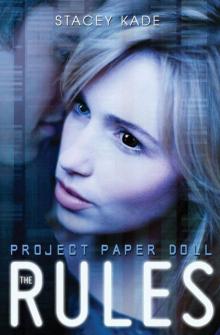 Project Paper Doll
Project Paper Doll